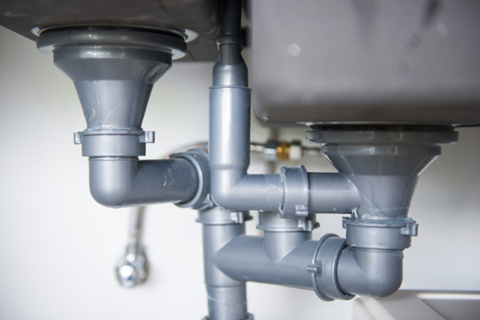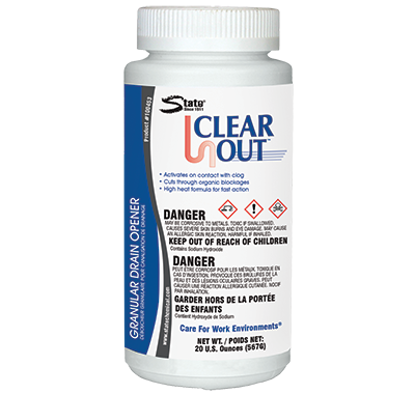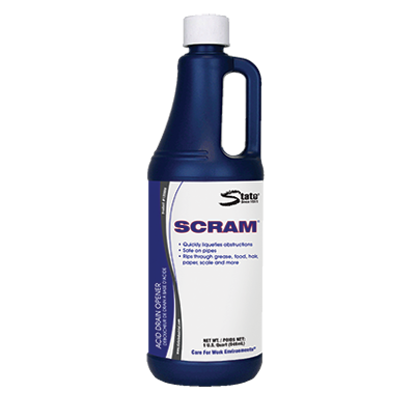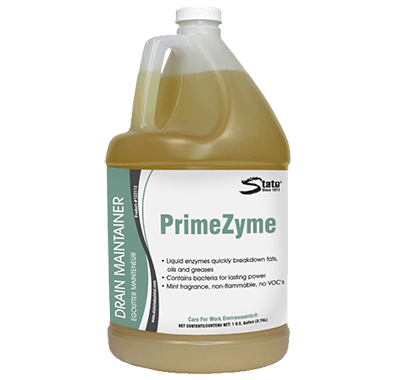Which State Chemical Commercial Drain Opener is Right for You?
Which State Chemical Commercial Drain Opener is Right for You?
Picture this: you’re an elementary school cafeteria manager. On a Tuesday morning, your kitchen is prepping food with twenty minutes until lunch—and that’s when the drain backs up. Your staff scrambles to unclog it as the clock ticks and dishes pile up, but with so little time and no solution on hand, you’re in a bind. This isn’t the first time this has happened—you know you need to be ready to fix it next time.
At State Chemical, we manufacture and distribute chemical solutions for various problems, including drain clogs. We know that you probably don’t give your drain much thought until it starts experiencing issues, meaning that you can get stuck in a difficult situation when these unexpected issues arise. Sometimes, they may not even be a surprise, but rather an inevitable recurrence.
To help you face your drain problems head-on, we will explain what drain openers do, which of State Chemical’s drain openers is the right fit for you, how to properly use drain openers, and how to reduce drain problems in the long run. After reading, you’ll know which commercial drain opener will work best for your facility, and you’ll have a better idea of your future approach toward drain care.
What is an Industrial Drain Opener?
You know that you need to do something to stop your frequent drain clogs, but to fix your issue, we must establish what an industrial drain opener is—and what it is not.

Drain openers are a reactive approach to a clogged drain. In other words, they are to be used when the drain is blocked and water will not pass through it, or they can also be used for slow drains. At these points, it’s clear that there is already an issue with a drain blockage, and a drain opener will be needed to resolve the issue.
This is different from a commercial drain cleaner, which is generally used as a preventative treatment to stop drain blockages from happening in the first place. Most drain cleaners should not be used to treat clogged drains since they won’t usually have any significant impact on an already-formed clog.
However, it is important to note that certain drain cleaners can treat slow drains. But for the most part, if your aim is to prevent future drain clogs, eliminate drain fly habitats, treat dry drain, or otherwise maintain your drains, it’s best to look into drain cleaners instead.
What is the Best Industrial Drain Opener from State Chemical for Me?
When searching for a commercial drain opener, you’ll need to consider several different factors depending on your facility. Some of these factors might be an acid or caustic preference, the level of severity of your clog, the cause of your clog, and a liquid or granular preference.
State Chemical offers three different industrial drain openers, each for different chemical needs and preferences.

Drain Rocket™
A non-acid liquid that’s heavier than water, Drain Rocket™ is a caustic drain opener that’s able to sink straight to the cause of the clog. From there, it generates heat and ends up boiling and pushing the clog out.
Drain Rocket is best for standard clogs involving fats, oils, and greases (FOGs) , sediment, or organics. Since it is non-acidic, it’s considered a safer option than acidic drain openers like SCRAM, and it’s easy to use, with users typically just pouring a pint bottle down the drain in question.
If your drain clog is extreme (e.g., a cotton clog), Drain Rocket is not the product for you, but it will be effective for the majority of blockages.
Clear Out™
Similar to Drain Rocket, Clear Out™ is a granular drain opener that sinks to the source of a clog before activating, where it will reach 212 °F to melt the clog. From there, the melted clog can pass easily through the pipes.
As a granular, Clear Out is generally considered less dangerous than liquid drain openers since there is less risk for splash back and it is easier to apply. It is also more economical with 25 uses per bottle and up to 200 uses per case. Clear Out also leaves behind a refreshing lemon scent whereas sulfuric acid drain openers tend to have an odor of rotten eggs.
For the most part, Clear Out should be used in the same cases where you would use Drain Rocket: when clogs are caused by FOGs, sediment, or organics. Clear Out is effective, economical, and less dangerous compared to many drain openers, but the most extreme clogs require a stronger choice.
Scram®
Regarded as the most heavy-duty drain opener State Chemical offers, SCRAM® is a sulfuric acid liquid drain opener. SCRAM is designed to be activated by water, so once it hits the drain, it sinks and disintegrates the clog.
If you have an acid preference, SCRAM is an effective choice, but it is designed forsevere situations. The product is strong enough that it can potentially cause damage to older pipes, weakened cast iron pipes, rusted-over pipes, and porcelain. That said, SCRAM is a tried-and-true product that works quickly and efficiently to clear your clog, but we recommend it only be used in extreme situations, such as for paper or cotton clogs.
When handling, wear personal protective equipment (PPE), as with all drain openers. We also recommend wearing a face shield.
How to Use an Industrial Drain Opener
When handling an industrial drain opener, be sure to familiarize yourself with the product’s individual safety information and directions. Each product label will have directions about how to use it, using the correct amount, and proper handling.

Wear PPE when handling all drain openers. This means wearing protective eyewear (including safety goggles or glasses intended for chemical protection), nitrile or rubber gloves, work boots, a face shield, and chemical-resistant clothing. And never look down over a drain to see if the product is working. Chemicals could splash back and cause bodily harm.
How to Prevent Drains from Clogging
Since you can’t stop all FOGs and other foreign objects from going down your drains, the best way to prevent drain clogs is by regularly using a drain maintainer. If you get consistently severe clogs, you might still need to use drain openers regularly. But in less severe situations, drain maintainers can be a way to avoid a constant need for drain openers.
Drain maintainers are chemicals that are regularly dispensed into your drains either by hand or via a feed pump. Once they enter your drain, they break down FOGs to help them pass easily through the pipes with the water. And once FOGs are broken down, they can’t cause clogs.
Using a drain maintainer doesn’t guarantee that your drain will never clog; after all, accidents happen. However, drain maintainers are a consistent way of managing your FOG buildup to prevent clogs.
Some drain maintainers can even be used to break up mild clogs or to fix slow drains. For example, State Chemical’s Grease-B-Gone® and PrimeZyme™ can sometimes be used to treat a minor drain issue. This way, they act as a reactive solution when you have a more pressing issue, but they also prevent future problems with continued use.
This method isn’t fit for all situations, especially if your clog is more severe. However, overall, if you deal with frequent drain problems, drain maintainers can be an effective way to prevent future clogs if you’d like to avoid consistently using drain openers.
Learn About the Cost of a Drain Care Program Agreement with State Chemical
When dealing with constant drain clogs, you want to know that you have something on hand when the drain inevitably backs up again—but it can be hard to find the right product. Now that you have a better idea of what kind of commercial drain opener you need, learn about the cost of State Chemical’s drain openers by watching the video below.












